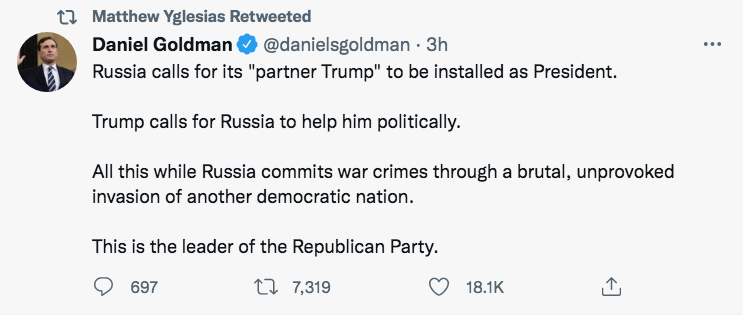100% of excessive inflation is due to bad monetary policy
Always.
This shouldn’t even be debatable. I don’t know of any respectable theory (monetarist, Keynesian, Austrian, etc.) where this is not true.
And yet according to this recent Vox article, economists have no idea what is causing the current bout of excessive inflation:
Among economists and experts, there’s no strict consensus about what exactly is to blame. There are certain factors widely agreed upon that we’ve been hearing about for months: supply chain woes, rising oil prices, shifting consumer demands. These concerns have hardly subsided. But there are other arenas where there’s more disagreement, such as the role government stimulus has played in increasing prices, and the possibility that corporate greed is an important factor. . . .
Whichever economist or expert or policymaker you ask to explain the current inflation story to you is going to tell you something slightly different. I asked a bunch of economists over the past couple of weeks what was causing inflation and how to fix it. Most kind of laughed for a second before launching into their cases, acknowledging the full answer is, to a certain extent, ¯\_(ツ)_/¯.
The Fed’s job is to insure an appropriate level of demand. On occasion, it may be appropriate for inflation to exceed 2% for a period of time due to supply issues. But that’s no excuse for excessive growth in nominal spending. When inflation is higher than it should be for demand side reasons, it is always 100% due to bad monetary policy.
And now Vox tells us that economists are now talking about “corporate greed”? Seriously?
And just who are these so-called “economists”? According to Vox they are “progressives”:
Many progressive economists and politicians are beginning to argue that it’s corporate consolidation that’s making inflation worse.
Wait, I thought it was right-wingers who were the creationists, global warming deniers, the anti-vaxxers? I thought the left believed we should “trust the science”? Since when did progressive economists become the left wing version of QAnon?
Ezra Klein has a must read interview of Larry Summers. One of Ezra’s questions is interesting. No, “interesting” isn’t quite right, it’s the single most revealing question I’ve ever seen from a reporter in my entire life.
EZRA KLEIN: So I know you’re a hard-nosed economist who looks at the numbers here. But I want to locate, I think, the emotional and to some degree even political frustration of this conversation, because a lot of the dynamics you’re talking about that then get framed as excess demand, there are things that feel just, that many of us have wanted for a long time. More hiring, wage increases, particularly at the bottom end, stimulus checks for people who have had a lot of bad years and didn’t have a lot of cushion behind them, child tax credit for families that could really use that.
And so there are a lot of policies that came together — I mean, there was a reason the Biden administration wanted to run the economy hot. There was a long period when it didn’t just feel, the economic data showed, that expansions were not reaching people on the margins. And it felt, finally, like we were reaching people on the margins. We were putting a lot of firepower to do that. But even in this terrible time, this horrifying pandemic, we were giving people who needed it quite a bit of help.
And then for that to then turn into this horrifying inflation problem, which is now eating back those wage increases, potentially going to require much sharper action from the Fed— I recognize the world doesn’t have to please me, but it is maddening. And I think one of the hard questions, before we even get into Ukraine and China— I think one of the hard questions is, does it have to be this way? Did it have to be this way? Is there some way for this to end without the people we were finally helping suffering?
If anyone wants to know how we got in this mess, it’s right there in Klein’s question. Kudos to Ezra Klein for being willing to reconsider his views when new information comes in. But the passionate desire to “run the economy hot” in a misguided belief it would help workers is precisely how we got into this mess. Jay Powell and all the other the run the economy hot people wanted it to be true that the 1960s never happened. (Recall how Powell cited 1965 as a successful soft landing!) But the 1960s did happen, and could happen again if the Fed doesn’t wake up.
Klein asks Summers about the nonsensical claims that inflation is caused by corporate greed, and Summers has this to say:
So I think it’s, frankly, ridiculous to take businesses saying on a earnings call that they have pricing power as some kind of evidence of perfidy. I just don’t think that is supported by any serious understanding of how the business process works.
And by the way, another way of looking at this is, again, to look at what’s happening to wages. Wage inflation is as pronounced a phenomenon as price inflation. And we don’t think workers have huge pricing power. Or another way to look at this is as relations in terms of what Amazon is paying its suppliers or what Walmart is paying its suppliers. Surely if there’s market power in the relationship between Walmart and its suppliers or between Amazon and its suppliers, the power is on the side of Amazon and Walmart. And they’re paying much higher prices to their suppliers.
So are there market power problems in the American economy? Yes. Is it a good idea to attack those problems? Yes. Is it fine if we use the motivation provided by inflation to do some of that? Yes. Does it make any sense at all to blame inflation on market power? No. That’s not serious economic reasoning and the judgments and forecasts of those who engage in that reasoning should be taken less seriously as a consequence.
The interview is quite long and worth reading in its entirety. Summers makes many of the points I’ve been making, and he recognized the inflation problem well before I did.
At one point the discussion turns to what the Biden administration could do to slow inflation. Summers points out that they could do a few things at the margin, but their actual policy has been almost the exact opposite, to reduce aggregate supply and make the problem worse:
LARRY SUMMERS: Mostly the tools are pretty limited. And the tools that there are, are tools that the Biden administration has so far been very reluctant to adopt. If we reduce tariffs, that would make more goods available at lower prices and perhaps reduce the Consumer Price Index by 1 percent or more. But their rhetoric has gone the other way on tariffs.
If we decided to do public procurement as inexpensively as possible, that would reduce prices of a whole set of things the government buys and increase competitive pressure. But we’ve instead indicated a desire to shift from buying cheap to buying America and buying in ways that protect certain key constituencies.
These policies would not reduce aggregate demand, but by boosting aggregate supply they would make the “appropriate” inflation overshoot of 2% smaller than otherwise (from a dual mandate perspective.)
If we could just stop talking about inflation and focus on NGDP growth then all of these concepts would be so much easier to explain. The language of macroeconomics is such a complete mess.
PS. Here’s what else Biden could do. He could “promote” Powell to Treasury secretary and replace him with Yellen or Summers. In 1979, G. William Miller was promoted to Treasury secretary, and replaced with Volcker.



